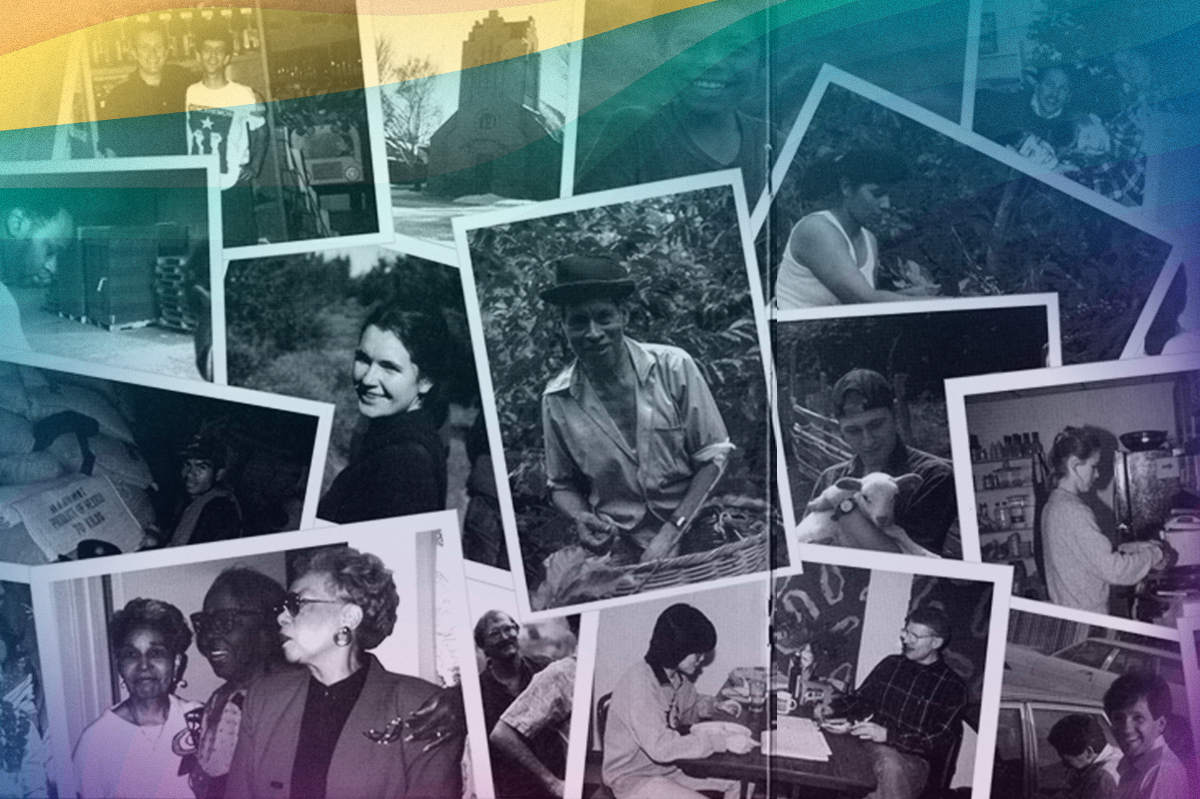May Day Reflections: Building a Democratic Workplace
Photo collage from the 1997 Equal Exchange Annual Report
As we celebrate our 36th anniversary on May 1, we reflect not only on our own worker-owned cooperative and co-op trade partners but also on the history of May Day.
Also known as International Workers’ Day, this is a day to celebrate and strengthen the ongoing struggle for labor justice and dignity for workers around the world. Through trade solidarity, a deep commitment to democracy, shared power, and shared economics, Equal Exchange reflects both an alternative economic model for the future and the long history of justice-seeking initiatives and achievements that have come before us.
‘One worker, one vote’ is a daring way to build a business.
Equal Exchange structured our workplace democratically to reflect the cooperative structure small-scale farmers were using. We were able to see how growers organized themselves in co-ops to rebuild their communities in Nicaragua, southern Mexico, and in the remote parts of the Andes. We modeled our own structure on those democratic ideals to be the change we wanted to see. Giving workers the power to participate in the Board of Directors and control over the profits (through patronage) is a clear contrast to the dominant capitalist system. Workers as owners build a level of accountability whereby everyone is taking care of fellow owners. There is not only a higher level of customer care and attention to quality when “we own it” – it’s more fun, too.
A learning organization
Being a learning organization is another benefit of having a worker-owned cooperative. Creating learning loops by engaging front-line employees comes and goes as a trendy topic in business schools. For co-ops, it’s been a core principle and everyday activity since the pioneers of the Rochdale cooperative in 1844. There is a real resiliency to a business where sometimes I’m meeting with my boss, and sometimes I am my boss’s boss’s boss. It motivates workers to learn all dimensions of the business and collaborate on ways to strengthen the entire co-op.
Diversity on the Board
The ways Equal Exchange puts these ideas into practice are deceptively simple. The Equal Exchange Board of Directors has 11 positions. Six of the director positions are designated only for worker-owners and are chosen in a vote by worker-owners. The Board also has up to three Citizen-Consumer seats, and up to two Board-Elected seats. Each Worker-Owner director is elected to three-year terms by the members at their Annual Meeting in May.
In the thirty-six-year history of Equal Exchange, more than five dozen different workers have served on the Board of Directors of the co-op. The diversity of backgrounds, skills, and outlooks each worker-owner has brought to service as a Director has made our cooperative stronger. Democracy takes practice, so having workers serve a few years on the Board and vote on strategic issues is a way we practice co-op principles.
Impact on farming communities
It is no mistake that a worker-owned cooperative makes and sells products that have the highest positive impact on farming communities. Whereas a strictly capitalist company might have moved into high-profit brand-building items (think of ready-to-drink beverages or trendy diet supplements), Equal Exchange has focussed on making and selling the foods that have the strongest positive impact at the farm. The cacao in our chocolate bars is grown on farms far removed from the regions where child labor is systemic. We sell pure teas because those democratic groups of tea growers are making profound social change. We added herbal teas, dried mango, and cashews to expand our efforts at farm-to-table education and support new projects in Burkina Faso and Egypt.
Cooperative innovations
As a worker-owned organization, Equal Exchange has made some innovations in the co-op sector. Former Equal Exchanger and recent Co-op Hall of Fame inductee Clark Arrington explained that when Equal Exchange started…
Clark Arrington (left) singing at an Equal Exchange party in 1994.
“…there was no such thing as investors in a cooperative. Cooperatives had members, but that was it. We created…this Class B option in a cooperative as a pioneering social impact investment. We offered 5%, so more than company bonds, but also supporting liberation struggles in Nicaragua, El Salvador, etc. It uses the capital of the market but keeps power in the hands of the workers for social change.”
Financial investment
There is a financial benefit to ownership, too. As an owner, a portion of any annual surplus is shared among the worker-owners through patronage; a portion of which is reinvested in the cooperative to finance operations. That capital has grown over time and for many of our co-op members represents a significant investment.









